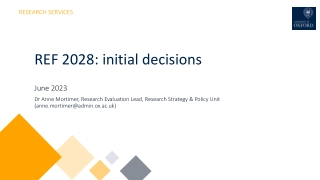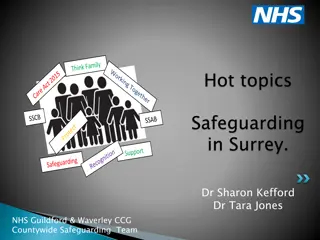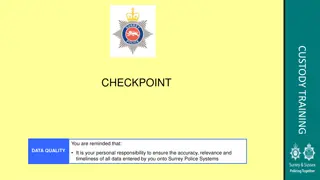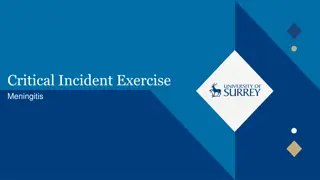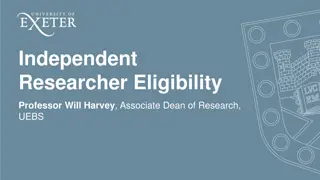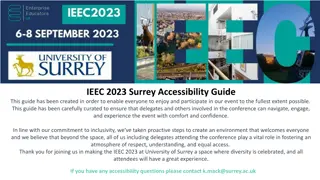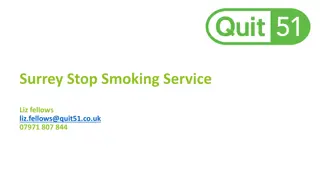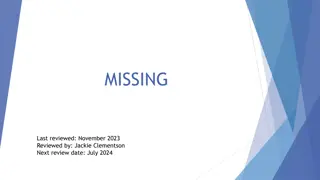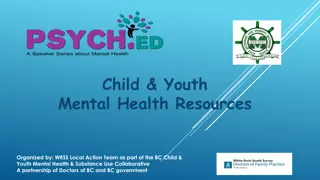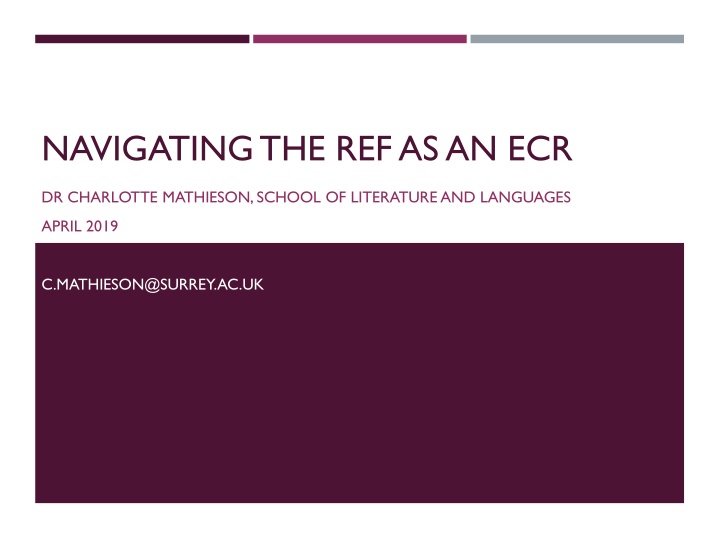
Navigating the REF as an Early Career Researcher - Key Considerations
Explore the key impacts of the REF 2021 strategy on Early Career Researchers (ECRs), including challenges, preparing for the REF, publication strategies, job market implications, and mental health considerations. Understand the areas of REF 2021 strategy that impact ECRs, such as decoupling and number of outputs, open access guidelines, and portability of outputs. Delve into additional challenges related to employability, conflicting advice, and disciplinary publishing expectations. Learn how to strategize for a REF-eligible post by the census date of July 31, 2020, ensuring compliance with department/school requirements and output eligibility criteria. Stay informed about the impact of the REF cycle on ECRs and navigate the complexities of the academic landscape effectively.
Download Presentation

Please find below an Image/Link to download the presentation.
The content on the website is provided AS IS for your information and personal use only. It may not be sold, licensed, or shared on other websites without obtaining consent from the author. If you encounter any issues during the download, it is possible that the publisher has removed the file from their server.
You are allowed to download the files provided on this website for personal or commercial use, subject to the condition that they are used lawfully. All files are the property of their respective owners.
The content on the website is provided AS IS for your information and personal use only. It may not be sold, licensed, or shared on other websites without obtaining consent from the author.
E N D
Presentation Transcript
NAVIGATING THE REF AS AN ECR DR CHARLOTTE MATHIESON, SCHOOL OF LITERATURE AND LANGUAGES APRIL 2019 C.MATHIESON@SURREY.AC.UK
OVERVIEW What do I need to consider as an ECR? Key impacts of REF 2021 strategy on ECRs; Difficulties and challenges. Preparing for the REF: Planning a publication strategy; REF and the job market; REF and mental health.
WHAT DO ECRS NEED TO CONSIDER? KEY POINTS Key areas of REF 2021 strategy that impact upon ECRs: Decoupling and number of outputs: output reduction at unit rather than individual level = ECR permitted reduction less clear at an individual level; Open Access: you must ensure that you are familiar and comply with open access guidelines for articles (not monographs); Portability of outputs: in place for this round, but watch out for proposed changes in the next cycle
WHAT DO ECRS NEED TO CONSIDER? ADDITIONAL CHALLENGES Employability and REF integrally bound up; But:not a straightforward mapping of REF requirements onto employability expectations: Publishing expectations vary across disciplines Arts & Humanities:monograph + 1-2 articles Sciences & Social Sciences:articles in high-impact journals ECR REF reduction vs.competitive job market; Different institutional REF strategies;conflicting/confusing advice
WHAT DO ECR NEED TO CONSIDER? STARTING TO STRATEGISE Will I be in a REF-able post by the census date of 31 July 2020? Yes: congratulations! You should familiarise yourself as much and as soon as possible with requirements and expectations in your department/school; If you have/do change institution ensure that you start such conversations as soon as possible; check areas such as double-weighting and output eligibility; Ensure that your outputs comply with open access guidelines where applicable.
WHAT DO ECRS NEED TO CONSIDER? STARTING TO STRATEGISE Will I be in a REF-able post by the census date of 31 July 2020? No:e.g.you are currently doing your PhD and not soon to be job-hunting: You do not need to worry about this REF cycle, but should stay aware and informed of what happens in this REF cycle,and how it impacts ECRs. Not sure:e.g.you have finished your PhD and are on the job market; You need to be up-to-date on information and planning carefully your publication strategy, as well as how you pitch this at job interviews; As the census date approaches,you may become aware that you will not be in a post where your outputs will be submitted; In this case, if you are close to publication of a major work such as a monograph, you may be better pushing back publication for post-2020; this would prevent wasted outputs and allow you to be a stronger position on the job market early in the next cycle.
PREPARING FOR THE REF: PUBLICATION STRATEGY Key points to consider: quality, quantity, timing Quality not quantity = golden rule Fewer, high quality publications is preferable to lots of lower ranking pieces New system of average multiplier rather than a portfolio of submissions per staff member = flexibility/pressure to make each output count for as much as possible. Time-efficient if you are stretched for research time as an ECR: focus on producing the best research in the time you have available.
PREPARING FOR THE REF: PUBLICATION STRATEGY Prioritise: Monograph: single-author, substantial (80-100k words) original research; can be double- weighted in REF. Article: 8-10k word original piece of research in peer-reviewed,respected journal. De-prioritise: Chapter in edited book collection:typically peer-reviewed (may lack rigour of journal);often shorter (5-6k words). Book review:(typically) not original research,shorter (1k words). Editing a book/special issue: not (necessarily) original research (but a lot of work).
PREPARING FOR THE REF: PUBLICATION STRATEGY Is a monograph essential? No: the monograph is just 1 of many possible outputs, including journal articles, book chapters and creative/practice based outputs. However: monographs are highly desirable: Potential for double weighting; Stronger potential to achieve 3*and 4*rating Furthermore: monograph remains the golden standard in many humanities disciplines, and a strong backbone of publication portfolio expected on the job market; Demonstrates ability for sustained argumentation, substantial contribution to the field, depth and breadth of scholarship not typically possible in articles/chapters.
PREPARING FOR THE REF: PUBLICATION STRATEGY Timing Your plan needs to aim towards having a REF-able portfolio by November 2020: Work backwards from the census date; factor in publication lead times: journal /publishing press timescale for submission, peer review, revisions, production process can be anything from six months to 2 years (+!) Journal special issues can be faster Talk to others about their experiences of different journals and book publishers
PREPARING FOR THE REF: PUBLICATION STRATEGY Focus around quality/quantity and timing Have a plan, even if it changes: Having a plan means being able to make the most of the time you have available to focus on what will be most valuable to your development Check back in regularly to reassess your current/pipeline research, and keep track of where publications are up to Having a plan will also serve you well in the job market.
REF ON THE JOB MARKET Job specifications typically include the criteria of being able to contribute to the REF It is important that you evidence this clearly and directly in your application/cover letter don t rely on your CV to speak to this Reiterate the wording on the job specification (e.g. contribute to advancing research productivity/research strategy) Refer specifically to the publications that would constitute your REF submission; Include publisher/journal titles; You can include an estimate of quality (3*/4*); Include pipeline works, but be specific. Include impact potential if you have it (full case study not necessarily expected but show possibilities)
REF ON THE JOB MARKET Be prepared to answer the question what will your REF submission be? Be prepared to reiterate and elaborate upon the information that you have given in your application/cover letter Focus especially on pipeline works, giving evidence of what/when/where: this is especially important if you have a number of pipeline works, as an employer needs to see that these are guaranteed potential submissions
REF AND MENTAL HEALTH Report on the impact of REF 2014 on ECRs: REF had a huge impact on ECR mental health and wellbeing; many respondents experienced high levels of anxiety, insecurity and uncertainty, and mental health problems stemming from REF pressure; also noted feeling isolated and unable to articulate concerns within highly pressurised and competitive workplace culture created by the REF; Lack of/conflicting/mis- information from institutions cited as a contributing factor. (See the impact of the REF 2014 on ECRs)
REF AND MENTAL HEALTH The emotional, physical, and intellectual work taken to sustain performances of disciplinary legitimacy (117) Sarah Burton, Writing yourself in? The Price of playing the (feminist) game in the neoliberal university , in Feeling Academic in the Neoliberal University: Feminist Flights, Fights, and Failures. Yvette Taylor and Kinneret Lahad (eds). Palgrave Macmillan. 2018.
FURTHER RESOURCES For full documentation see the key documents page on the REF website: https://www.ref.ac.uk/guidance/key-documents/ Guidance on submissions includes full details of the submissions including open access policy (page 26) Panel criteria and working methods includes information on output types, assessment criteria, and related information The guidance on codes of practice document is less relevant to individuals, but it is useful if you want to know more about issues of equality, diversity and transparency at institutional level. Talk to your mentor/research director/experienced colleagues in your field, particularly around disciplinary norms for types of outputs, issues around interdisciplinary research; stay as informed as possible via workshops, HE News and other outlets; I report on the latest updates on my blog and try to make the guidelines accessible and applicable to ECRs: https://charlottemathieson.wordpress.com/
C.Mathieson@surrey.ac.uk @CEMathieson






